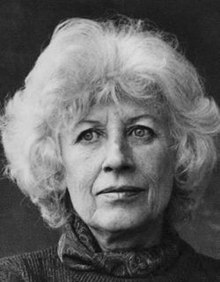Olga Havlová
| Olga Havlová | |
|---|---|
 |
|
| First Lady of the Czech Republic | |
|
In role 2 February 1993 – 27 January 1996 |
|
| President | Václav Havel |
| Preceded by | Position established |
| Succeeded by | Dagmar Havlová |
| First Lady of Czechoslovakia | |
|
In role 29 December 1989 – 20 July 1992 |
|
| President | Václav Havel |
| Personal details | |
| Born |
Olga Šplíchalová 11 July 1933 Žižkov, Prague, Czechoslovakia |
| Died | 27 January 1996 (aged 62) Prague, Czech Republic |
| Resting place | Vinohrady Cemetery, Prague |
| Nationality | Czechoslovak, Czech |
| Spouse(s) | Václav Havel (1964-1996; her death) |
Olga Havlová, née Šplíchalová (July 11, 1933 in Prague – January 27, 1996 in Prague) was the first wife of Václav Havel, the last President of Czechoslovakia and first President of the Czech Republic.
Olga Havel was born in Žižkov, "one of the roughest, working-class districts of Prague", in a working-class family. She spent her childhood in a way typical for such a harsh environment. Her parents split up when she was six years old. In a large family, also including Olga’s older sister Jaroslava’s family (a single mother of five children), any free hand was useful. Therefore, it was obvious that Olga cared for her young nieces and nephews since her childhood. As a child, she also attended Milíčův dům established by Přemysl Pitter. Olga used to spend a lot of time in libraries where she acquired her strong lifelong love of literature. Although her family’s life was modest, Olga’s mother used to take her children to cinema and theatre quite often. After graduating from secondary school, Olga became a trainee in the Tomáš Baťa factory, where she also worked afterwards. In the course of working on a sewing machine, she lost four fingers on her left hand.
When she was about twenty, she was an enthusiastic theatre lover and attended the drama classes of Professor Lydie Wegener. Together with her other pupils, she acted in an amateur theatre performance in Divadlo Na slupi (which does not exist anymore). During the 1950s, she went through a number of different jobs. She worked, e.g., as an accountant, a store keeper, a sales assistant.
Olga met Václav Havel at the Prague writer's hangout Café Slavia in the early 1950s and married him in 1964. During the 1960s, her husband became a respected author both at home and in Europe. In the second half of the 1960s, he - as a writer and a contributor to the cultural magazines - was involved in a democratization process, particularly in the field of culture. He advocated freedom of speech, independence of culture, return of full-fledged civil rights. During the years 1961 – 1967, Olga Havel worked at the theatre Divadlo Na zábradlí (Theatre on the Balustrade) where Václav was also active until 1968. Václav Havel made no secret of the fact that, despite the diversity of personalities and family environment as well as all the usual problems of life and crises, Olga meant a lot for him. He appreciated how quickly this seemingly ordinary young woman from Žižkov became a part of the Prague intellectual environment of the 1950s and '60s, that she was an attentive first reader and critic of his essays and dramatic works, a valuable supporter and collaborator in the difficult years of Charta 77 as well as a reliable lifelong partner.
...
Wikipedia
